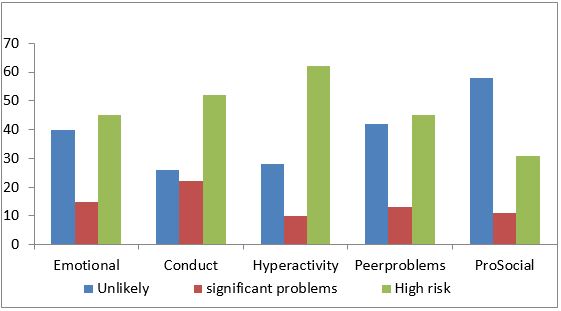Pattern of Parental Handling in Children with Emotional and Behavioural Disorders - A Cross Sectional Study
Abstract
Abstract
The role of biological and social parents in shaping the mental and physical health of a child has been well-documented. Researchers over the years have developed typologies that categorize parental behaviour into prototypes and also examined their influence on the developmental outcome. Parenting styles are often considered a characteristic of the parent which is independent of the characteristics of the developing child while parenting behaviour is considered bidirectional and influenced by early childhood or infant behaviour. An overwhelming body of evidence indicates the close relationship between parenting and childhood behaviour, as well as on the effect of various modifying factors including physiology, parental mental health, cultural differences, ethinicity, and societal factors. Cross-cultural studies in the field have so far been limited largely to developed countries even as the subject is highly relevant to developing economies with their over-stretched mental healthcare systems. The objectives of this study is to determine patterns of parental handling in children with emotional and behavioural disorders consulting the child & adolescent psychiatry clinic in a tertiary care centre, and to determine the correlation of parental handling patterns to the child’s behavioural and emotional symptoms. The present study endeavours to determine the parenting pattern among parents of children utilizing psychiatric services at a tertiary care centre in Kerala, South India.
Downloads
References
2. Couperus, Jane W, Charles A. Nelson. "Early brain development and plasticity." Blackwell handbook of early childhood development (2006); 85-105.
3. Bornstein M. H. Parenting and child mental health: a cross‐cultural perspective. World Psychiatry, 2013;12(3):258-265.
4. Darling N, Steinberg L. (1993). Parenting style as context: An integrative model. Psychological bulletin.2013; 113(3):487.
5. Symonds PW. The psychology of parent-child relationships. New York: Appleton-Century-Crofts; 1939.
6. Baldwin A L. Behaviour and development in childhood. New York: Dryden Press; 1955.
7. Sears RR, Maccoby EE, Levin H. Patterns of child rearing. Stanford University Press; 1976.
8. Schaefer ES. A circumplex model for maternal behavior. The Journal of Abnormal and Social Psychology.1959; 59(2):226.
9. Becker WC. Consequences of different kinds of parental discipline. Review of child development research.1964;1: 169-208.
10. Baumrind D. Effects of authoritative parental control on child behaviour. Child development. 1966; 887-907.
11. Lewis CC. (1981). The effects of parental firm control: A reinterpretation of findings. Psychological Bulletin.1981; 90(3):547.
12. Maccoby EE, Martin JA. Socialization in the context of the family: Parent-child interaction. Handbook of child psychology.1983; 4(4):1-101.
13. Baumrind D. The influence of parenting style on adolescent competence and substance use. The Journal of Early Adolescence. 1991; 11(1):56-95.
14. Crockenberg S, McCluskey K. Change in maternal behavior during the baby's first year of life. Child Development. 1986; 746-753.
15. Feldman R., Weller A, Zagoory-Sharon O, Levine A. Evidence for a neuroendocrinological foundation of human affiliation plasma oxytocin levels across pregnancy and the postpartum period predict mother-infant bonding. Psychological Science. 2007; 18(11):965-970.
16. Insel TR. A neurobiological basis of social attachment. American Journal of Psychiatry. 1997; 154(6):726-735.
17. Gordon I, Zagoory-Sharon O, Leckman JF, Feldman R. Oxytocin and the development of parenting in humans. Biological psychiatry. 2010;68(4):377-382.
18. Feldman R, Zagoory-Sharon O, Weisman O, Schneiderman I, Gordon I, Maoz R, et al. Sensitive parenting is associated with plasma oxytocin and polymorphisms in the OXTR and CD38 genes. Biological psychiatry. 2012; 72(3):175-181.
19. Byford M, Abbott R A, Maughan B, Richards M, Kuh D. Adolescent mental health and subsequent parenting: a longitudinal birth cohort study. Journal of epidemiology and community health. 2014; 68(5):396-402.
20. Pelaez M, Field T, Pickens JN, Hart S. Disengaged and authoritarian parenting behavior of depressed mothers with their toddlers. Infant Behavior and Development. 2008; 31(1):145-148.
21. Baumrind D. An exploratory study of socialization effects on black children: Some black-white comparisons. Child Development. 1972; 261-267.
22. Dornbusch SM, Ritter PL, Leiderman PH, Roberts DF, Fraleigh MJ. The relation of parenting style to adolescent school performance. Child development. 1987; 1244-1257.
23. Steinberg L, Mounts NS, Lamborn SD, Dornbusch SM. Authoritative parenting and adolescent adjustment across varied ecological niches. Journal of Research on Adolescence. 1991; 1(1):19-36.
24. Byrnes HF, Miller BA. The relationship between neighbouρod characteristics and effective parenting behaviours the role of social support. Journal of family issues. 2012; 33(12):1658-1687.
25. Rutter M. (2002). Nature, nurture, and development: From evangelism through science toward policy and practice. Child development.2002; 1-21.
26. O'Connor TG, Scott S. Parenting and outcomes for children. Joseph Rowntree Foundation; 2007.
27. Turner EA, Chandler M, Heffer RW. The influence of parenting styles, achievement motivation, and self-efficacy on academic performance in college students. Journal of College Student Development. 2009; 50(3):337-346.
28. Malhotra S. A parental handling questionnaire. Indian journal of psychiatry.1990; 32(3):265.
29. Balda S, Irving K, Berthelsen D, Catherwood DF. Parental control in Australia and India: a cross-cultural study. Journal of Human Ecology. 2001; 12(2):133-139.
30. Russell A, Hart C, Robinson C, Olsen S. Children's sociable and aggressive behaviour with peers: A comparison of the US and Australia, and contributions of temperament and parenting styles. International Journal of Behavioral Development. 2003; 27(1):74-86.

Copyright (c) 2023 Author (s). Published by Siddharth Health Research and Social Welfare Society

This work is licensed under a Creative Commons Attribution 4.0 International License.


 OAI - Open Archives Initiative
OAI - Open Archives Initiative


